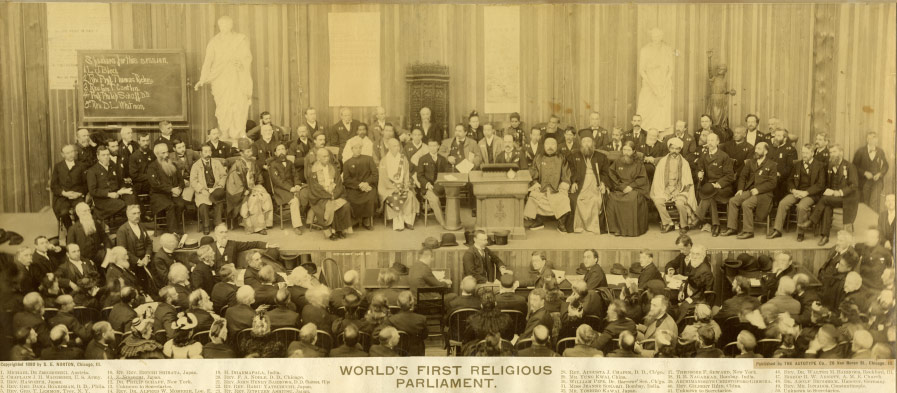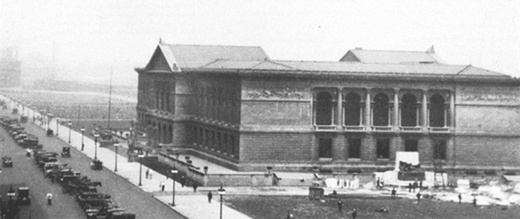The views expressed in our content reflect individual perspectives and do not represent the authoritative views of the Baha'i Faith.
There will be no peace among the nations without peace among the religions. There will be no peace among the religions without dialogue among the religions. – Dr Hans Küng, Professor of Ecumenical Theology and President of the Foundation for a Global Ethic.
If you’re ever in the American midwest, don’t miss the Art Institute of Chicago and the incredible art it offers. In a beautiful late 19th-century Beaux Arts building in Grant Park, you can see Van Gogh’s Self Portrait, Renoir’s By the Water, Grant Woods’ American Gothic, Picasso’s The Old Guitarist, Manet’s Jesus Mocked by the Soldiers, Kandinsky’s Landscape with Two Poplars and Monet’s Wheatstacks, End of Summer. The Art Institute is the second-largest art museum in the United States—but even more important, it’s the birthplace of worldwide, formalized interreligious dialogue.
That’s right—you can actually go and visit the place where the world’s religions first got together and began to talk. It happened 121 years ago in Illinois, of all places.
The original intention of the building, at Chicago’s 1893 World Columbian Exposition (one of the first World’s Fairs) was to host the World Parliament of Religions, the inaugural formal meeting of representatives of both Eastern and Western religious traditions, and the pioneering, first-ever attempt to create a global dialogue among Faiths. The conference included the traditional Abrahamic religions—Judaism, Christianity and Islam—but also featured new religious movements of the time, like Christian Science, Spiritualism, and the Baha’i Faith. At the Parliament of Religions the Presbyterian missionary, author and founder of the American University of Beirut Reverend Henry Jessup addressed the gathering, and became the first person to ever mention the Baha’i Faith in the United States.
 With a fascinating synergy, the World Parliament of Religions initially convened the year immediately after the 1892 passing of Baha’u’llah, the prophet and founder of the Baha’i Faith. Baha’u’llah spent forty years in exile, tortured and imprisoned for teaching the oneness of God and the essential unity of all religions. Throughout his life, and long before that first interreligious gathering convened in Chicago, Baha’u’llah called on the leaders of religion to come together in harmony and peace:
With a fascinating synergy, the World Parliament of Religions initially convened the year immediately after the 1892 passing of Baha’u’llah, the prophet and founder of the Baha’i Faith. Baha’u’llah spent forty years in exile, tortured and imprisoned for teaching the oneness of God and the essential unity of all religions. Throughout his life, and long before that first interreligious gathering convened in Chicago, Baha’u’llah called on the leaders of religion to come together in harmony and peace:
The fundamental purpose animating the Faith of God and His Religion is to safeguard the interests and promote the unity of the human race, and to foster the spirit of love and fellowship amongst men. Suffer it not to become a source of dissension and discord, of hate and enmity. This is the straight Path, the fixed and immovable foundation. Whatsoever is raised on this foundation, the changes and chances of the world can never impair its strength, nor will the revolution of countless centuries undermine its structure. Our hope is that the world’s religious leaders and the rulers thereof will unitedly arise for the reformation of this age and the rehabilitation of its fortunes. Let them, after meditating on its needs, take counsel together and, through anxious and full deliberation, administer to a diseased and sorely-afflicted world the remedy it requireth…. – Baha’u’llah, Gleanings from the Writings of Baha’u’llah, p. 215.
Which leads us directly to the second Baha’i recommendation for stopping religious contention:
2. Establish A World Interreligious Council to Settle Interfaith Disputes
The Baha’i solution to faith-based conflicts, which comes directly from Baha’u’llah’s writings, advocates establishing a global interfaith body designed to mediate and settle any and all religiously-motivated disputes. Conceptually similar to the idea behind the United Nations, this new worldwide group could be called United Religions:
We are considering the divine plan for the reconciliation of the religious systems of the world. Baha’u’llah has said that if one intelligent member be selected from each of the varying religious systems, and these representatives come together seeking to investigate the reality of religion, they would establish an interreligious body before which all disputes and differences of belief could be presented for consideration and settlement. Such questions could then be weighed and viewed from the standpoint of reality and all imitations be discarded. By this method and procedure all sects, denominations and systems would become one. – Abdu’l-Baha, The Promulgation of Universal Peace, p. 233.
This planetary interreligious body hasn’t become a reality yet, although several precursor organizations have formed a firm foundation for its eventual establishment. Since the initial World Parliament of Religions gathering in 1893, the global inclination for interreligious cooperation has grown dramatically. Many interfaith groups have taken shape, bridging religious, cultural and sectarian differences and working together for the common good. Baha’is passionately promote, support, encourage and take part in these groups in communities around the world.
In the year 2000, citing just one example of several, a global grassroots interfaith organization called the United Religions Initiative formed with the enthusiastic participation of Baha’is around the world, its aims focused on promoting interfaith cooperation and understanding, ending religiously-motivated tension and violence, and creating cultures of justice, peace and healing for the Earth and all living beings. Several other groups similar to URI work diligently to mitigate and heal the divisions between the religions, creating a mass movement around the globe.
Conflict, violence and war violate the spirit of love and unity every great Faith originally brought to humanity. To avoid those terrible consequences and heal the interreligious divisions that plague our world today, the world needs a united interreligious body, representative of all belief systems and empowered by the leadership of each great Faith. Let’s figure out a way—all of us, of any religion or no religion—to make that happen.
You May Also Like
Comments

















web page here for further reading https://parliamentofreligions.org/parliament/new-chicago-1893/new-chicago-1893 and the same website details The 2018 Parliament of the World's Religions hosted in Toronto, Ontario Canada • November 1 - 7, 2018